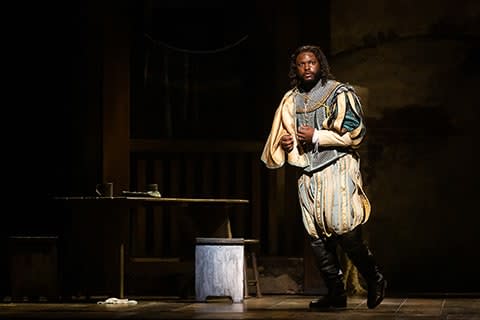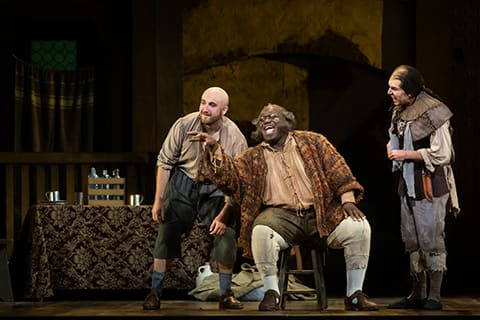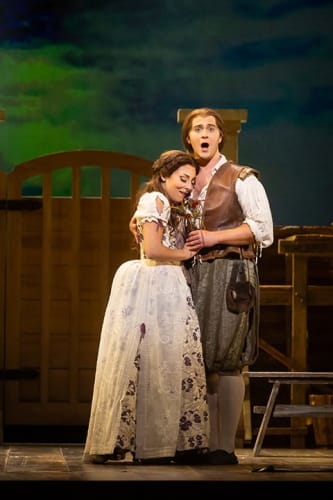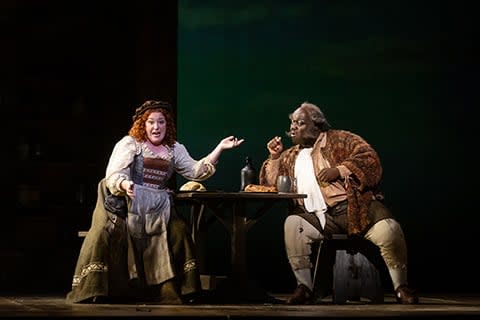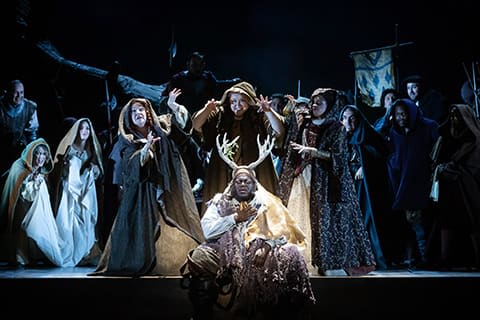As I’ve noted before in these reviews, a friend of mine once said, more or less, “lesser-known pieces are lesser-known for a reason.” Well, Falstaff is certainly less known than, say, a Traviata, or a Rigoletto. The middle period Verdi is well known (and therefore sells tickets, lots and lots of tickets). They are often the meat and potatoes that can really firm up an opera company’s books. That’s just a fact, but it may not be as great a move for new audience development, even if doing so helps with savings on production values.
The fact remains, though, that Otello and Falstaff, in that order, are truly great operas, and, to my mind and taste, Verdi’s greatest two works. They’re brilliant. And so I’m glad to see that Houston Grand Opera (HGO) has scheduled Falstaff, which is a piece that is lots of fun and musically complex.
Falstaff is one of the operas in Verdi’s long list of hits which utilises mostly lighter voices (by his general standards, at least). More correctly, it utilises voices that may be quite large but sound lighter, suitable to the piece of froth that is the primary source for Falstaff, Shakespeare’s The Merry Wives of Windsor. Merry indeed, fooling the licentious knight wanting to seduce both of them, sadly, with the very same note, word for word, and outwit their husbands (here reduced to one husband only).
Attracting large numbers of younger people to the opera is done in one of two ways: this production of Falstaff uses the first. Its Butler Studio, a training programme for young artists, gives them opportunities that used to be very hard to find. And, like many such programmes, the Butler Studio seeks out young singers of colour. I want to be absolutely clear: this does not represent a sacrifice of quality for the sake of political correctness. It just gives those singers a chance to shine. And shine they do. Of the ten principal singers, no fewer than seven are either Butler Studio artists or former Butler Studio artists, some making their mainstage debuts. Of the remaining three, two were making their HGO mainstage debuts. Some folks like to see the same singers over and over, but not me. The HGO is doing great work at developing the next generation of singers.
And what singers!
All were excellent, with antics that pleased the audience. There are no villains in this work, just poor old Doctor Caius (Martin Bakari), a traditional theatre character called the Senex, literally “the old man.” He wants to marry the young and desirable Nannetta (Andrea Carroll); she wants nothing to do with him and is in love with young and dashing Fenton (Jack Swanson). They deserve to find true love and, as sung by Carroll and Swanson, do.
The four women, all collectively the smartest women in Windsor, Meg Page (Emily Treigle), Alice Ford (Nicole Heaston), Mistress Quickly (Jennifer Johnson Cano) and Nanetta herself, are on to good old lech Falstaff from the get go. And they put him in his place, first causing him to be dumped in the river along with dirty laundry, and then putting him in costume that, conveniently, has the horns that are the traditional sign of the cuckolded husband—here attached to the would-be thwarted lover / fool.
They’re certainly smarter than Ford, Alice’s husband, who is in mortal fear of being cuckolded. He has nothing to worry about: he’s not the brightest bulb in the set, but he’s much smarter than Falstaff. Who wouldn’t be?
Sadly, Falstaff, that sad fool of a lover, has fired his two accomplices, Bardolph and Pistol, ostensibly for incompetence and disobedience, but actually because Falstaff has run out of money. Traditional clowns, they sing and play their parts wonderfully.
And Falstaff himself, Reginald Smith, Jr., was great in this debut role. His first Falstaff, I am sure it won’t be his last. He was amazing, like all his compatriots, singing this role with gusto (literally, there are few moments when Falstaff is not eating or drinking when on stage).
This production bodes very well indeed for opera houses all over the world as these singers go on to greater and greater glory.

